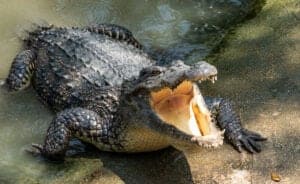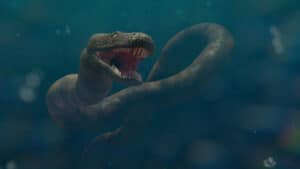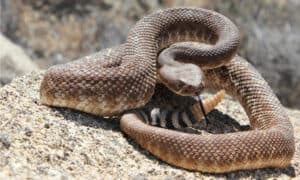Water moccasins, more commonly known as cottonmouths, live both on land and in water, making them more dangerous to humans and other animals. They are pit vipers like rattlesnakes and copperheads, which means they belong to a large group of venomous snakes with long, hinged fangs that deliver a powerful venom. As pit vipers, cottonmouths also have a heat-sensing pit between their nostrils and eyes that help them track down prey.
We are well aware that most snakes are dangerous for many animals, but some are more harmful. But is a water moccasin poisonous or dangerous to humans? While they are not poisonous to touch or eat, cottonmouth bites are highly venomous and can kill humans.
Their venom is deadly, and their bite can cause severe complications if not treated immediately.
Water Moccasin Bites
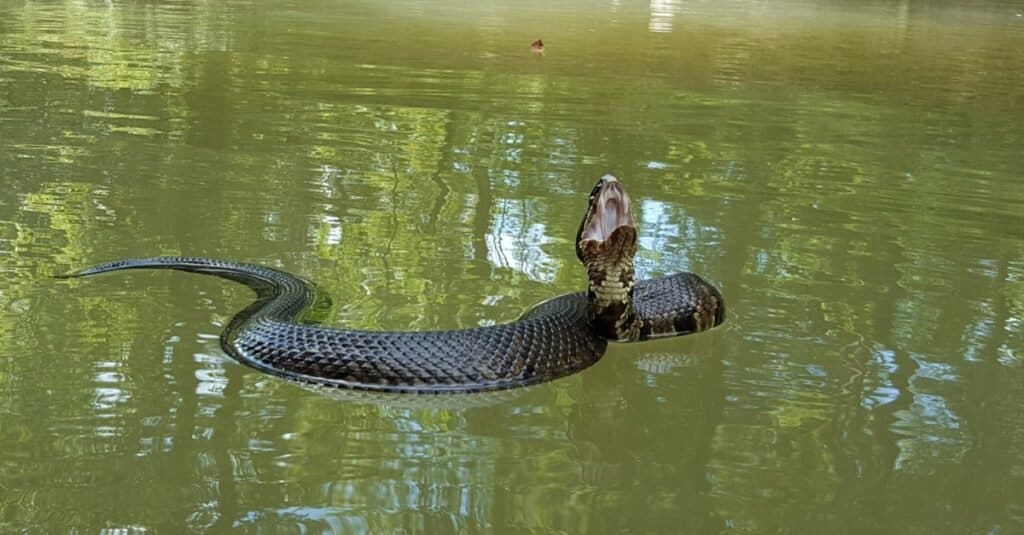
Water moccasins are very common in wetlands.
©Seth LaGrange/Shutterstock.com
Cottonmouth venom can seriously incapacitate animals and even humans. In some incidents, their bites and venom can lead to death. Water moccasins have earned their reputation of being extremely dangerous because of their venom and the effects of their bites. But in reality, cottonmouths are not aggressive and would rather not attack. Often, cottonmouths bite when they are picked up by humans or stepped on. They primarily use their long fangs to catch prey, but they may use them to bite and threaten a potential predator or humans.
Water moccasin bites have potent venom that can kill animals and humans alike. These bites can lead to muscle damage, internal bleeding, loss of an extremity, and intense pain in the bite site. Cottonmouth’s venom generally affects tissues, so their bite may cause swelling and cell death and decay. It also acts as an anticoagulant, which hinders blood clots. With too much blood pressure, cottonmouth bites can lead to severe complications or even death.
Do Water Moccasins Bite Underwater?
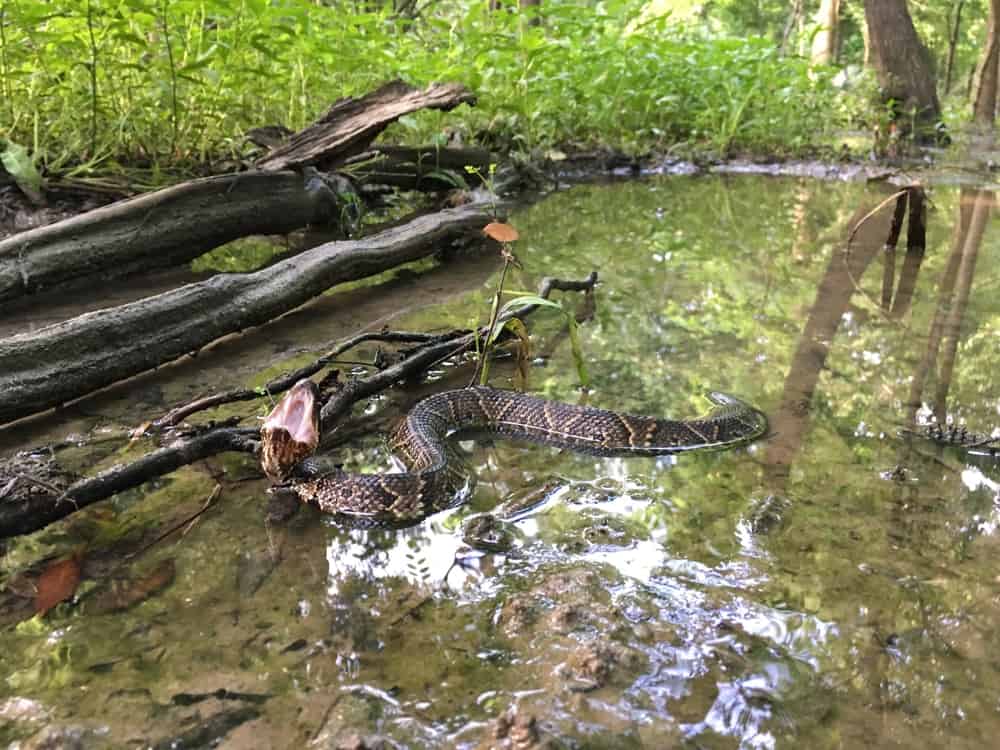
Water moccasins can bite you underwater when they feel threatened.
©Joe Farah/Shutterstock.com
Water moccasins are semi-aquatic snakes, which means you can encounter them both on land and in water. They can bite you underwater, but keep in mind that cottonmouths only bite when provoked or when they feel threatened. Based on a study at the Tropical Journal of Medicine and Hygiene, 80% of the recorded bites underwater were on the lower legs, which indicates that the victims may have accidentally stepped on them in water.
Water moccasins are venomous snakes, so they wouldn’t have to rely on constriction to capture and kill their prey. They use their long fangs in grabbing and incapacitating their prey, but they can also use them when fighting back against predators or even humans. The cottonmouth’s fangs are twice the length of their teeth and are separated, making them more prominent and frightening. These fangs are made of hollow tubes where the water moccasin injects its venom to its prey or adversary.
Are Water Moccasins Dangerous to Humans?
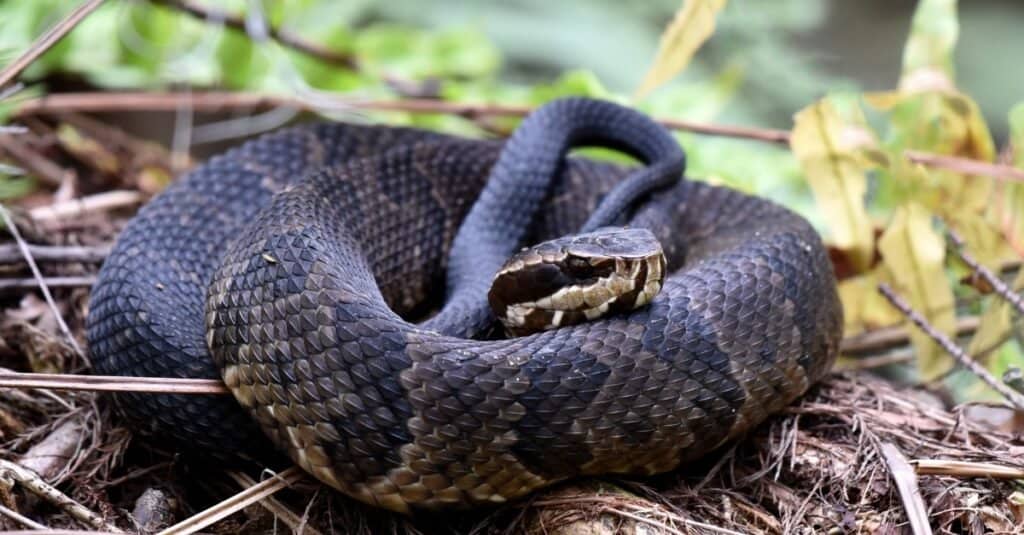
Water moccasins bites are very dangerous to humans.
©Rini Kools/Shutterstock.com
Water moccasins are among the most feared venomous snakes in the wild, along with rattlesnakes, coral snakes, and copperheads. Most people are terrified of the cottonmouth’s fearsome reputation because they are often portrayed as aggressive snakes that will chase and bite humans. Yet, contrary to popular belief, they only bite when provoked or stepped on.
Myths have circulated over the years that cottonmouths chase people. However, none is true because most snake species, including the cottonmouth, only bite in self-defense. Often, water moccasins will escape and hide rather than fight. Yet, the water moccasin’s bite should not be ignored, as these snakes possess one of the most potent snake venom that can kill humans.
Symptoms of a water moccasin bite include:
- Signs of shock
- Skin discoloration
- Rapid or difficulty breathing
- Swelling of lymph nodes adjacent to the bite site
- Intense and immediate pain accompanied with rapid swelling
- Changes in heart rate
- Metallic, minty, or rubbery taste in the mouth
- Numbing or tingling around the mouth, feet, scalp, tongue, or bite site
It is crucial to seek medical attention once bitten by a water moccasin because the venom can cause dramatic collapse due to blood pressure. If not attended to immediately, water moccasin bites can lead to death.
Symptoms of a cottonmouth’s bite can show between minutes to hours from the time of the bite. Patients bitten by cottonmouths should be observed for eight hours upon envenomation and may only be discharged if no physical or hematologic signs appear.
Are Water Moccasins Always Around Water?
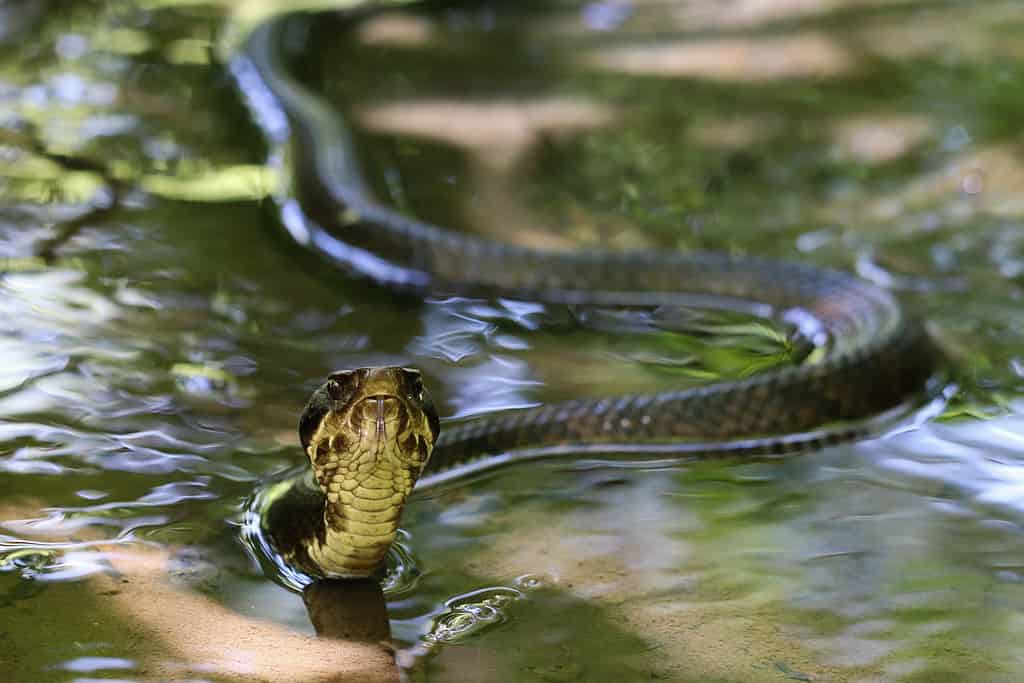
Water Moccasin are semiaquatic and spend much of their life in or around water.
©Rafael R Sandoval/Shutterstock.com
Water Moccasins sunbathe on land or perch on logs and stumps close to the water’s edge, and they swim with their heads held high above the water, their bodies floating on the surface. When feeling threatened, they might flick their tails and open their mouths.
Cottonmouths are semiaquatic, which means they are equally at ease both in the water (hence their alternate name, water moccasin) and on dry land. They are the sole venomous snake species in the United States known for their significant aquatic activity.
Water Moccasin Fatalities
Water moccasins are deadly as their bite delivers potent venom that can kill humans. However, most bites rarely lead to death when attended to immediately. According to the University of Florida, cottonmouths accounted for only 1% of all deaths from snakebites in the United States. In 1971, a fatal hand bite on a 28-year-old man was recorded in Garyville, Louisiana. In 2015, a 37-year-old man was bitten on his leg in Nixa, Missouri and did not seek medical attention. He died the following day.
Although few reports relate water moccasin bites to death, cottonmouths are dangerous enough to cause serious complications. Death may be a rare result of a water moccasin bite, but their bite wounds are no mild injuries either. They can leave scars or even result in a limb or arm amputation. Medical attention includes antivenom drugs that help fight the venom in the person’s system as quickly as possible.
How to Avoid Water Moccasin Bites
Water moccasins are not aggressive, even though most people say so. The best way to avoid them is to try your best to keep out of their way. Once you accidentally step on them, they may lash out and bite as a self-defense instinct. But as long as you are not doing anything to provoke them, they wouldn’t chase you or bite you on purpose. You must also refrain from handling water moccasins and be alert when you are wandering in their habitat.
The photo featured at the top of this post is © Rini Kools/Shutterstock.com
Discover the "Monster" Snake 5X Bigger than an Anaconda
Every day A-Z Animals sends out some of the most incredible facts in the world from our free newsletter. Want to discover the 10 most beautiful snakes in the world, a "snake island" where you're never more than 3 feet from danger, or a "monster" snake 5X larger than an anaconda? Then sign up right now and you'll start receiving our daily newsletter absolutely free.
Thank you for reading! Have some feedback for us? Contact the AZ Animals editorial team.



